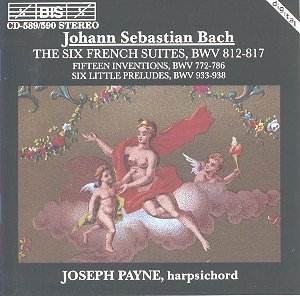| Johann Sebastian
BACH (1685-1750) |
French Suites
Fifteen Inventions
Six Little Preludes
Suite I in D minor [12.06]
Suite II in C minor [16.17]
Suite III in B minor [15.34
Suite IV in E flat major [14.15]
Suite V in G major [18.31]
Suite VI in E major [16.26]
Fifteen Two-Part Inventions [23.56]
Six Little Preludes [11.19]
 Joseph Payne, harpsichord Joseph Payne, harpsichord
Rec: March 1992.
 BIS-CD 589/590
[133.35] BIS-CD 589/590
[133.35]
Crotchet
AmazonUK
AmazonUS
Amazon
recommendations |
 |
|
Bach's French Suites are among his most appreciated keyboard works. Their
relative ease of playing (compared to more complex works, such as the Partitas,
or the Goldberg Variations) has ensured their place in the repertoire of
amateur keyboard players, both harpsichordists and pianists. These six suites,
three in minor keys and three in major keys, are highly melodic, and show
a wide variety of invention throughout their different movements. Written
according to a standard set of dance movements, these are happy, lively works.
Joseph Payne approaches these suites in a different manner than many performers.
Unlike many pianists, he makes no attempt to turn them into virtuoso showcases,
by playing them at breakneck speed. And unlike some harpsichordists, he avoids
turning them into over-ornamented avatars of French keyboard works, like
those of Couperin. While they are called French Suites, they are not specifically
French. This name was given to them by F. W. Marpug in 1762, but, curiously,
it is Bach's English Suites that sound more French!
Payne's approach to these suites is intimate and reserved, yet he does not
hesitate to play somewhat more freely in the repetitions of the various
movements. His interpretation is clear and unambiguous; firm in, say the
first suite, more delicate, almost dainty in the sixth suite. Under Joseph
Payne's fingers, these works take on a new feeling.
This two-disc set also features some excellent "fillers"; since the French
Suites themselves are not very long, Bis had the good idea to add the Two
Part Inventions and Six Little Preludes.
The Two Part Inventions, originally written with a pedagogical goal, are
some of Bach's most interesting "little" pieces. Curiously, one can easily
overlook the intricate counterpoint in these works; I only appreciated them
when trying to play them. Payne gives a clear, unambiguous performance of
them, helping show them more as the inventive works they are rather than
simply exercises for intermediate harpsichordists. (Payne also made an excellent
recording of these Inventions on clavichord for Hänssler, last year,
as part of the W. F. Bach Klavierbüchlein.)
The six Little Preludes (again, not the name given by Bach) is another group
of works of limited difficulty, which Bach apparently used with his students.
Again, far more than simple studies, these works show that Bach could write
pedagogical works with great musicality.
On all of these works, Payne uses all the possible sounds of his instruments
(a beautiful Ruckers copy, by William Dowd, with two manuals, and a magnificent
copy of a Flemish harpsichord, by David Jacques Way, also with two manuals)
to enhance the music, adding as much variety as possible. The impeccable
recording (as is often the case with recordings by Bis) adds to the immense
pleasure that this disc provides.
A brilliant recording of some of Bach's most appreciated keyboard works.
If the remarkable sound of the recording is not reason enough to buy this
set, the delicate and flexible phrasing and subtle ornamentation should be.
Kirk McElhearn

